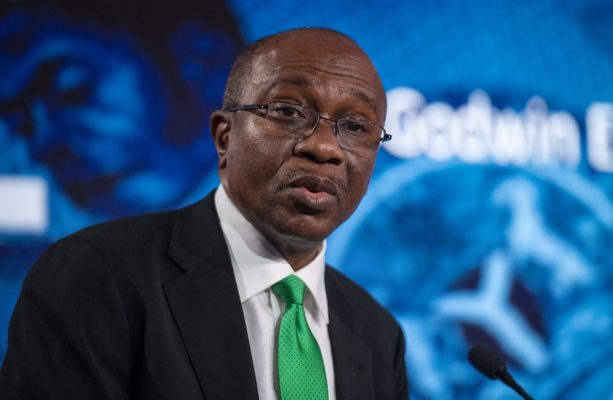
THREE months on, the damage to the economy wrought by the Central Bank of Nigeria’s ill-timed and riotously implemented naira redesign policy is still raging. Amid scarcity of both the old and new naira notes, the face-saving missive that Godwin Emefiele, the CBN Governor, would personally embark on physical monitoring of Deposit Money Banks to ensure that they were paying out the old naira notes as directedcame as a comical relief. Monetary policy has been so badly mismanaged under Emefiele that his continued stay in office is questionable.
As businesses and individuals groan under the cash scarcity, CBN’s Monetary Policy Committee raised the benchmark lending rate to 18 percent, accentuating the difficulty in the business operating environment. Clearly, beyond the crisis accompanying the currency redesign, the CBN under Emefiele’s superintendence has faltered in its core mandates.
The Centre for the Promotion of Private Enterprise, a think tank, estimates that Nigeria has lost N20 trillion to the naira redesign policy since it started in January 2023. The Director-General, CPPE, Muda Yusuf, attributed the losses to the deceleration of economic activities, crippling of trading activities, stifling of the informal economy, contraction of the agricultural sector, and the paralysis of rural economy.
CPPE said the economy was gradually grinding to a halt because of the collapse of payment systems across all platforms, noting that digital platforms were performing sub-optimally due to congestion. “Physical cash is unavailable because the CBN has sucked away over 70 per cent of cash in the economy,” it said.
Even after the Supreme Court faulted the naira redesign policy and ordered that the withdrawn N200, N500, and N1,000 notes be re-circulated after weeks of acute shortage of the redesigned notes, the CBNinitially ignored the ruling. It also ignored intense public criticism. It took a denial by the President, Major General Muhammadu Buhari (retd.), of complicity in defying the court, threat of contempt proceedings and of a nationwide strike by the Nigeria Labour Congress before it directed the banks to begin re-circulating the old notes.
The CBN had similarly initially ignored the Supreme Court’s interim injunction on the same subject. Emefiele defied public opinion, lawmakers, economists, and multilateral financial institutions on the catastrophic effect of not extending the deadline for the old notes to cease being legal tender.
Beyond the devastation caused by the naira crisis, the economy is in a mess, with key indicators spiralling. After a dip in December 2022, the National Bureau of Statistics says headline inflation has been rising steadily; from 21.34 per cent in December, to 21.82 per cent in January 2023, and 21.91 per cent in February. Unofficial estimates are much higher.
Other basic functions of the CBN; to maintain external reserves, and safeguard the value of the national currency, have not fared better. The official exchange rate of the naira to the United States dollar in 2014 just after Emefiele took over was N165 in the official market, while the parallel market rate was N190. Today at the parallel market, it hovers between N741 and N748, while the official rate is N460.35.At a time in late 2022, it was over N800. Andersen, a global consultancy, predicts that the rate may reachN900 to $1 soon if the triggers are not addressed.
External reserves totalled $36.3 billion in October 2014. At the end of 2022, the reserves stood at $37.09billion;though a marginal increase, this shows that the country has made very little progress in the last nine years.
Interest rates have similarly remained high in double digits, with the bank adjusting the MPC rates incrementally upwards from 13.5 per cent to today’s 18 percent. Citing prohibitive interest rates among other factors, the Small and Medium Enterprises Development Agency of Nigeria disclosed that two million SMEs across the country collapsed between 2029 and 2021.Admittedly, interest rates have risen globally due to shocks, including the COVID-19 pandemic and the Russia-Ukraine war, taxing the ingenuity of central bankers, while the Nigerian government’s imprudent fiscal policies exert negative impact; yet, many experts insist that the CBN has failed to effectively leverage its legal independence to maximally moderate money supply and rates. Continental rival, South Africa, raised its MPC rate to 7.25 per cent in January.
Controversially, the CBN has been reckless with the Ways and Means advances window, (including printing of money), to fund the profligate Federal Government. By October 2022, Ways and Means advances to the government according to data from the CBN website quoted by the media had reached N23.8 trillion, up from N17.5 trillion in December 2021. Within a space of just 10 months, the bank had provided the government with N6.3 trillion!
Apart from fuelling inflation and subsidising a thriftless and unaccountable government, observers complain that the CBN has been flagrantly violating the law.The PUNCH reported that the government paid interest of N4.12 trillion between 2019 and 2022 on the loans from the CBN, and plans to repay the principal through treasury bills and bonds issuance.
The CBN Act 2007authorises the bank to grant temporary advances to the government regarding temporary deficiency of budget revenue at such rate of interest as the bank may determine. But the total amount of such advances must not at any time exceed five per cent of the government’s previous year’s actual revenue. This threshold is routinely breached.
The CBN has been unable to effectively rein in the DMBs,which are blatantly robbing customers with extortionate charges, and violating regulations, often without commensurate punishment.
The Anchor Borrowers’ Programme initiated by the government and funded by the CBN to help farmers improve their productivity is wobbly, with beneficiaries owing N463 billion as of March 2021, according to data from the CBN Economic Report. The IMF lamented last month that 76 per cent of the loans are not repaid.
Recklessly too, Emefiele plunged headlong into the political fray, and sought the presidential nomination of the ruling All Progressives Congress, heedless of the incongruity of a sitting CBN governor being enmeshed in partisan politics. Interestingly, beneficiary farmers of the ABP reportedly contributed the N100 million nomination fee for him.
Obviously, Emefiele has run out of ideas. Moreover, he has compromised the bank’s independence. The hike in the MPC rate by 50 basis points to 18 per cent in an economy that is gasping for breath, and the riotous foreign exchange market marked by multiple official rates, as much as N250 to N300 difference between official and parallel rates, and the consequent illegal arbitrage this fosters, all point to policy failures.
Together, Buhari and Emefiele have been bad for the economy.Mercifully, Buhari’s term will end by May 29, but Emefiele too,whose second term officially ends mid-2024, should be persuaded to step down earlier, failing which he should be pushed out as provided by the law.





